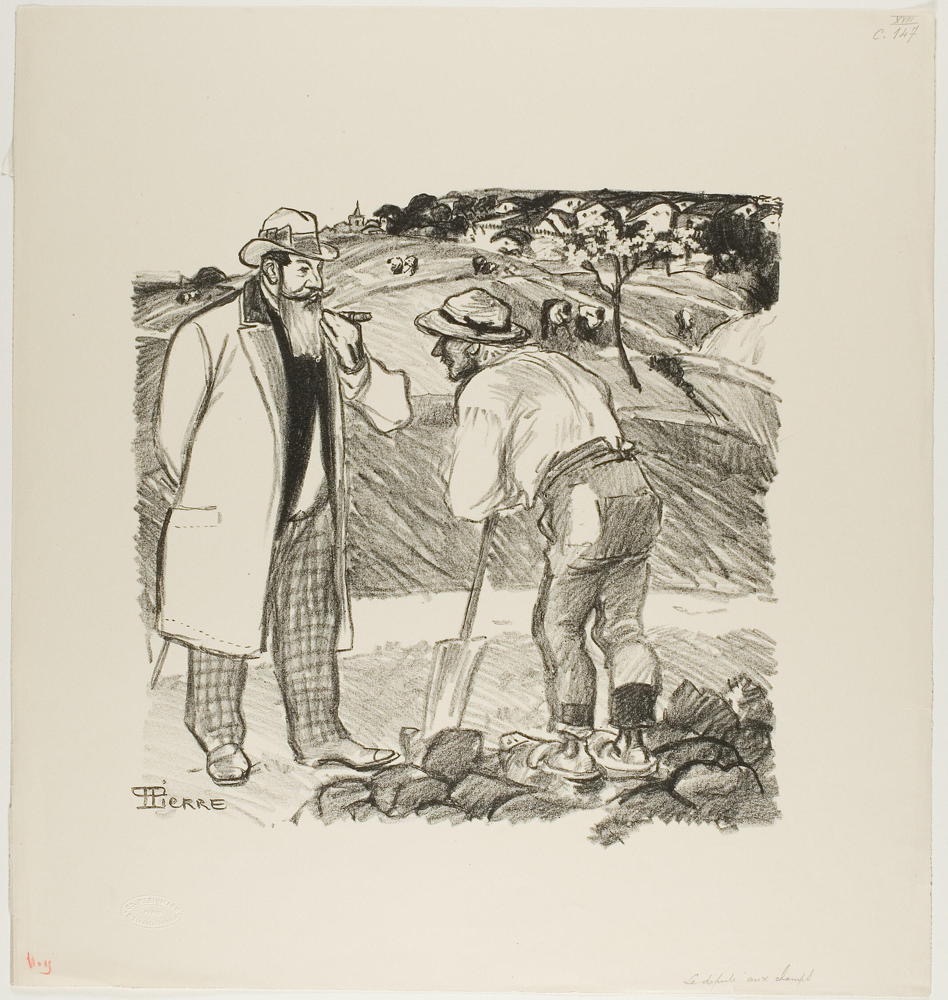Inspecting

Théophile-Alexandre Steinlen:
The Field Inspector (April 1894)
"Placating paves more streets than protesting ever did."
When we finally collected the permit required to start our porch project, after nearly two long years of failing to satisfy its requirements, I asked about inspections because I didn't know the rules. The permit person said our contractor would know when to call for inspections, so I set that issue aside as beyond my purview. I had not thought another second about Inspecting until late yesterday afternoon when Joel, our carpenter, dropped by to survey progress. The footing had been poured that afternoon, and all seemed right with the world. Joel asked if the inspector had visited yet. He hadn't, as far as I knew, but I had not been trying to stay in the know on that issue. Joel went on to say that said inspector might insist that we encase the porch deck supports in concrete, too, and that he usually wants to see the rebar inside a form before concrete's poured. However, he often happily assumes the work was done properly if he knows the contractor. The footing concrete has already been poured. He could insist, if he wanted to be a real son-of-a-bitch, that we remove the newly poured footing to confirm it has the required rebar embedded in it.
This practice should be confusing because I'm not now and have never even aspired to become a member of the contractor society that lives and dies by the judgments and rulings of city inspectors. The actual rules are also ambiguous, requiring judgment to work. Disagreements are rare but not unknown. An inspector can demand scope increases, paid for by the homeowner and scheduled by the contractor, without asking or caring what the homeowner or the contractor wants. He can blow up a budget, so we should pay close attention. Pablo, our concrete contractor, over-engineered the as-yet uninspected footing. The engineer's plans called for a minimum of one-foot by one-foot since the porch doesn't bear much weight. Pablo built a two-foot by two-foot footer, reinforced with two long strands of rebar inside, an immovable wall. Over-engineering is one stragegy to ensure the inspector doesn't halt progress. It's hard to argue with excess.
I have never known how systems work. The Muse seems to figure them out while I remain distantly amused at their antics, surprised by their gyrations. There's always an obscure rule set governing operations and an even more obscure book of exceptions. The system's master can justify any action by cleverly interpreting their understanding of the rules. Inspectors tend to trend toward interpreting the letter rather than the spirit of their laws, though there are exceptions. To hear the conservatives complain, the whole society is threatened by "harmful" regulations, many of which were enacted for the expressed purpose of preventing harm from being done. The deconstruction we just accomplished, taking down that poorly engineered brick facework, eliminated some potential harm allowed by the apparent lack of regulation or enforcement of the regs. We're still marveling how those floating pillars were not bearing loads. The roof had apparently been supported by a form of magic no inspector would have allowed.
I want to be sure that we're adequately feeding our inspector. Worse-case scenarios tend to emanate from inspectors who get called in too late to influence outcomes. I'd rather we invite him too often than not often enough. I do not want to ignore his authority or appear to be disrespecting it because that sort of behavior can encourage bureaucratic vengeance. If the inspector ever feels the need to get even, pity his target. Regulations work like Napoleonic Law, where the accused is presumed guilty until they can prove their innocence, a stiffer lift than merely proving guilt. Administrative Law doesn't need guilt. It runs on innuendo and accusation. My business law professor at university stressed one point repeatedly: do not ever get sideways to the law because if you do, you'll regret it. The best possible outcome in an administrative state comes from avoidance. Submit to the Inspecting, acquiesce to the inspector's judgment, and thank him for his insights. Placating paves more streets than protesting ever did.
©2024 by David A. Schmaltz - all rights reserved


